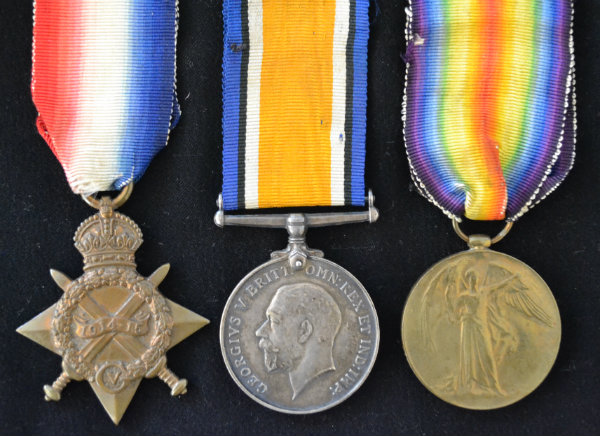Personal Details
Born: 9 June 1890 in Whitchurch, Shropshire and baptised in Whitchurch on 4 July the same year.
Family: He was the second of seven children of John Nunnerley Joyce, a farmer, and his wife Annie. The 1939 Register indicates that Stanley was married, but no records can be found to confirm this.
Residence: At the time of his baptism the family were living in Wicksted Hall, Wirswall, Whitchurch. In 1901 he lived at Little Cloverley, Prees, Wem, Shropshire; by 1911 the family had moved back to Wicksted Hall, Wirswall, Whitchurch. In 1930 he lived at 50 York Road, Shiresbrook, Mansfield, Nottinghamshire. The 1939 Register shows him living at 2 Beech Hill Avenue, Mansfield, Nottinghamshire. At the time of his death he was living at 24 Hawkstone View, Tilstock, Shropshire.
Employment: He was a farmer in 1911; in 1939 he was Clerk, Ministry of Labour.
Died: 9 February 1955 in Whitchurch, aged 64, and was buried on 12 February the same year in Whitchurch cemetery.
Military Details
Regiment: Royal Air Force (previously Royal Naval Air Service and Shropshire Yeomanry)
Rank: Flight Commander
Service Number: F1864
Date of Enlistment: 18 June 1913
Date of Discharge: 20 July 1919
Reason for Discharge: Transferred to unemployed list
Other Information: His brother, Thomas Joyce, also served in WW1.
Stanley was awarded the Campaign Medals (1915 Star, Victory and British War Medals)

The 1914 Star (also known as 'Pip') was authorised under Special Army Order no. 350 in November 1917 and by an Admiralty Fleet Order in 1918, for award to officers and men of the British and Indian Expeditionary Forces who served in France or Belgium between 5 August and midnight of 22–23 November 1914. The former date is the day after Britain's declaration of war against the Central Powers, and the closing date marks the end of the First Battle of Ypres.
The 1914–15 Star (also known as 'Pip') was instituted in December 1918 and was awarded to officers and men of British and Imperial forces who served against the Central European Powers in any theatre of the Great War between 5 August 1914 and 31 December 1915. The period of eligibility was prior to the introduction of the Military Service Act 1916, which instituted conscription in Britain.
The British War Medal (also known as 'Squeak') was a silver or bronze medal awarded to officers and men of the British and Imperial Forces who either entered a theatre of war or entered service overseas between 5th August 1914 and 11th November 1918 inclusive. This was later extended to services in Russia, Siberia and some other areas in 1919 and 1920. Approximately 6.5 million British War Medals were issued. Approximately 6.4 million of these were the silver versions of this medal. Around 110,000 of a bronze version were issued mainly to Chinese, Maltese and Indian Labour Corps. The front (obv or obverse) of the medal depicts the head of George V. The recipient's service number, rank, name and unit was impressed on the rim.
The Allied Victory Medal (also known as 'Wilfred') was issued by each of the allies. It was decided that each of the allies should each issue their own bronze victory medal with a similar design, similar equivalent wording and identical ribbon. The British medal was designed by W. McMillan. The front depicts a winged classical figure representing victory. Approximately 5.7 million victory medals were issued. Interestingly, eligibility for this medal was more restrictive and not everyone who received the British War Medal ('Squeak') also received the Victory Medal ('Wilfred'). However, in general, all recipients of 'Wilfred' also received 'Squeak' and all recipients of The 1914 Star or The 1914/1915 Star (also known as 'Pip') also received both 'Squeak' and 'Wilfred'. The recipient's service number, rank, name and unit was impressed on the rim.

